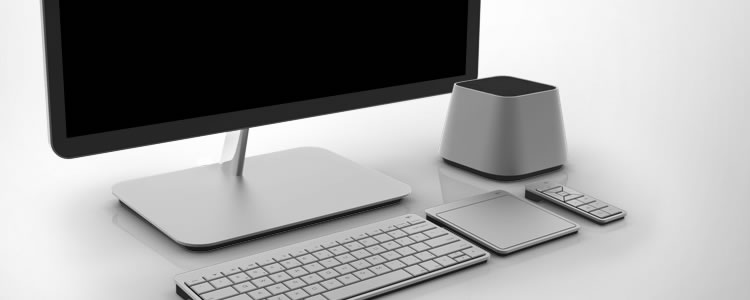When Apple updated its notebook lineup earlier this month we were eager to find out how well the new MacBook Air stacked up next to a couple of Ultrabook alternatives. Turns out the so-called "Apple Tax" wasn't as much of an issue as Apple detractors often claim. In fact, when it comes to its base models Apple is relatively in line with the competition, although upgrades from Apple tend to carry a bigger premium.
Now we're taking a look at another area of the PC market that's experiencing healthy growth in recent times, comparing Apple's 27-inch iMac to all-in-one alternatives from the likes of Dell, HP and newcomer Vizio. As we've said before, we don't expect this comparison to be representative of the entire Apple Tax argument, but it will help paint a better picture as we contrast it with our previous findings.
Right off the bat you'll notice that when it comes to all-in-one desktops there are much cheaper alternatives to Apple's iMac. But in all cases shown here, going with the base model means sacrificing discrete graphics, and sometimes making do with a less powerful processor or less RAM as well. That may be an advantage if you don't need a more powerful system, but for the purpose of this article we've configured each option as closely as possible to the iMac so we can make a fair comparison.
If you are looking for a space saving desktop but don't want or care to spend a few extra bucks on discrete graphics and other improvements, both HP and Vizio offer very capable machines starting at $1,100 without too many compromises --- the recently announced Vizio AIOs start with a Core i3 and none offers an optical drive. Dell's XPS One starts at $1,400 but includes a higher resolution display that matches the one on the iMac.
Even after sprucing up the specs on competing all-in-one systems, Apple's iMac came out as the more expensive alternative. It's also the only one still using a Sandy Bridge processor. Although in terms of performance it won't make a huge difference, it's something to keep in mind when making your purchase.
Overall, the Dell XPS One 27 seems like the most rounded out alternative in the side-by-side spec comparison. For $100 less than the iMac you get a beautiful 27-inch, 2560 x 1440 resolution display, better processor, the same 1TB of storage, twice as much RAM, a great port selection and comparable GPU power --- you'll get decent gaming performance but none of these is by any means a gaming machine.
If you can sacrifice a few pixels and live without an optical drive (I can't remember the last time I used one, anyway) the maxed-out Vizio All-In-One costs $1,350 and offers plenty of bang for the buck.
Besides the usual raw specs here are a few other things to consider:
-
Design: This one is going to be subjective and will vary on a case-by-case basis. All the choices listed here feature attractive designs. Apple favors a cleaner look by keeping all ports on the back, but users may prefer the convenience of having an easily accessible USB port or card reader on the side.
-
HDD / SSD: As configured, only the Vizio AIO combines a traditional hard disk drive with SSD caching to boost performance, while the Dell XPS One 27 offers a similar arrangement with their $2,000 model --- unfortunately you are limited to a few fixed configurations so you can't just make a storage upgrade. Apple lets you swap out the HDD for a 256GB SSD but that will cost you an obscene $500, while HP offers 160GB and 256GB SSD upgrades for a more palatable $275 and $300, respectively.
-
TV Tuner / HDMI-in: The HP Omni ships with an optional TV tuner, which we've included in our configuration, and there's also an optional HDMI input for $50 that can be used to watch programming from a set-top box or play console games. Dell includes a Digital ATSC/QAM analog TV tuner as well as an HDMI input at no extra cost. Vizio also offers an HDMI input but Mac users are out of luck here. The iMac works as monitor only with devices that output video through DisplayPort, such as a MacBook Pro.
-
Accessories & extras: All models ship a wireless keyboard and mouse, except for the Vizio which replaces the mouse for a wireless touchpad akin to Apple's Magic Trackpad. Vizio also includes a subwoofer unit to complement the sound of its built-in speakers and an IR remote.
Closing Remarks
Whereas in our last comparison it was a close call between the MacBook Air and similarly spec'ed Ultrabooks, the differences are more apparent when it comes to All-in-One desktops. Putting aside the fact that the iMac hasn't been upgraded with Intel's Ivy Bridge processors or the latest generation of graphics, there are several aspects in which Apple's machine is matched or bested by the competition.
That may change in the coming months with a hardware refresh, and if Apple starts feeling the pressure, maybe even a slight price drop like they did with the higher-end MacBook Air recently. But for now it's safe to say the "Apple Tax" is real in the AIO market --- less noticeable when you consider the higher resolution screen compared to most of the competition but there's still a premium.
In short, not only there are more options to accommodate different budgets in the Windows camp, there are real high-end models that will give the iMac a run for its money. For those that are too invested in the Mac platform and won't consider an alternative it'd still be a wise move to wait for an update if possible.




